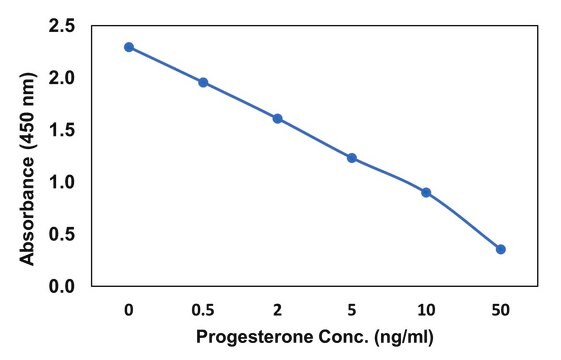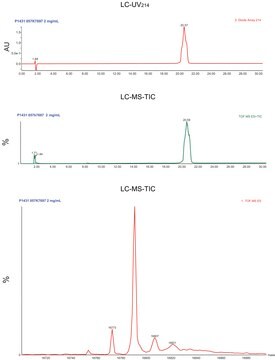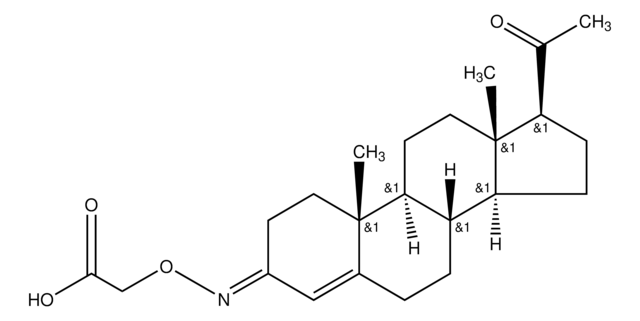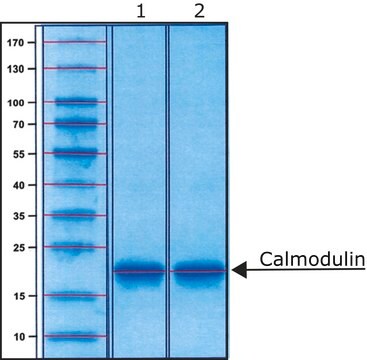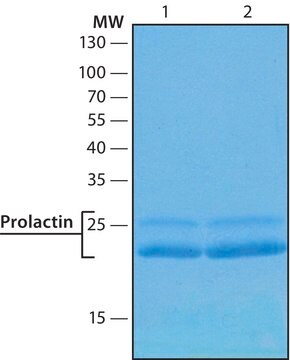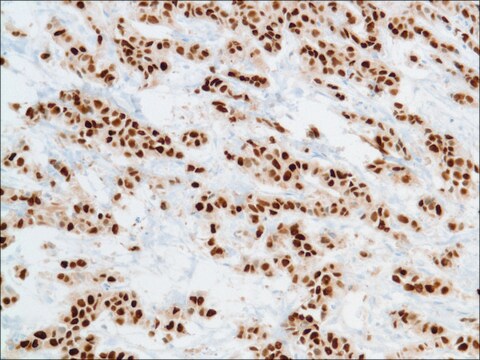Wszystkie zdjęcia(2)
Kluczowe dokumenty
P1922
Monoclonal Anti-Progesterone antibody produced in rat
clone 2H4, tissue culture supernatant
Zaloguj sięWyświetlanie cen organizacyjnych i kontraktowych
About This Item
białko sprzężone:
unconjugated
application:
ELISA (i)
RIA
RIA
klon:
2H4, monoclonal
metody:
indirect ELISA: 1:1000 - 1:2000 (using Progesterone-BSA for coating.)
radioimmunoassay: suitable
radioimmunoassay: suitable
citations:
10
Polecane produkty
pochodzenie biologiczne
rat
Poziom jakości
białko sprzężone
unconjugated
forma przeciwciała
tissue culture supernatant
rodzaj przeciwciała
primary antibodies
klon
2H4, monoclonal
metody
indirect ELISA: 1:1000 - 1:2000 (using Progesterone-BSA for coating.)
radioimmunoassay: suitable
izotyp
IgG1
Warunki transportu
dry ice
temp. przechowywania
−20°C
docelowa modyfikacja potranslacyjna
unmodified
Powiązane kategorie
Opis ogólny
Progesterone or P4 (pregn-4-ene-3,20-dione) is a female steroid hormone that belongs to the hormones class, progestogens. It is produced by majorly by ovaries, adrenal glands and placenta of humans and other species. Progesterone derived from placenta and corpus luteum is required for the maintenance of pregnancy. Progesterone inhibits the T cell mediated immune response involved in tissue rejection. The progesterone levels in females are low before ovulation and are elevated during the luteal phase. Monoclonal Anti-Progesterone antibody is IgG1 isotype purified from rat cell culture supernatant.
Immunogen
progesterone-7-BSA.
Zastosowanie
The antibody may be used in various immunochemical techniques including ELISA, radioimmunoassay AND RIA to measure progesterone levels in milk.
Komentarz do analizy
dextran coated charcoal 3H RIA.
Oświadczenie o zrzeczeniu się odpowiedzialności
Unless otherwise stated in our catalog or other company documentation accompanying the product(s), our products are intended for research use only and are not to be used for any other purpose, which includes but is not limited to, unauthorized commercial uses, in vitro diagnostic uses, ex vivo or in vivo therapeutic uses or any type of consumption or application to humans or animals.
Ta strona może zawierać tekst przetłumaczony maszynowo.
Nie możesz znaleźć właściwego produktu?
Wypróbuj nasz Narzędzie selektora produktów.
Kod klasy składowania
10 - Combustible liquids
Klasa zagrożenia wodnego (WGK)
nwg
Temperatura zapłonu (°F)
Not applicable
Temperatura zapłonu (°C)
Not applicable
Wybierz jedną z najnowszych wersji:
Masz już ten produkt?
Dokumenty związane z niedawno zakupionymi produktami zostały zamieszczone w Bibliotece dokumentów.
Diana Sorg et al.
Journal of dairy science, 100(10), 8205-8219 (2017-08-15)
The objectives of this study were (1) to analyze the agreement of a standard laboratory ELISA for progesterone (P4) with an automated on-farm ELISA kit operated under commercial conditions in 1,297 milk samples from 50 dairy cows; (2) to study
Aenne Honnens et al.
The Journal of reproduction and development, 57(1), 43-48 (2010-10-19)
The objective of this study was to investigate the relationships between uterine perfusion and estrogen, progesterone and the uterine nitric oxide synthase (NOS) system in five trotter mares during the estrous cycle. Color Doppler sonography for measurement of uterine blood
Yinqiu Wu et al.
Steroids, 67(7), 565-572 (2002-05-09)
A series of progesterone-4-ovalbumin (OVA) conjugates with different length linkers (4-, 11-, and 18-atoms long) were synthesized by successive aminocaproic acid homologation of 3-(pregn-4-ene-3,20-dione-4-yl)thiopropanoic acid (1) before conjugation to ovalbumin. The performance studies of these progesterone-4-ovalbumin conjugates showed that the
B C Braun et al.
Theriogenology, 71(5), 754-761 (2008-11-18)
Diagnosis of pregnancies is an important management tool for the Iberian lynx Conservation Breeding Program, a program geared to recover the world's most endangered felid. Non-invasive methods such as fecal hormone analyses are not applicable to the lynx, since fecal
Kim Carnaby et al.
Reproduction (Cambridge, England), 144(4), 477-484 (2012-07-26)
Lynx presents a unique sexual cycle with persistent corpora lutea (CLs) and elevated serum progesterone (P₄) throughout parturition and lactation. In other mammals, CLs normally disintegrate after parturition, therefore the aim of our study was to characterise the annual life
Nasz zespół naukowców ma doświadczenie we wszystkich obszarach badań, w tym w naukach przyrodniczych, materiałoznawstwie, syntezie chemicznej, chromatografii, analityce i wielu innych dziedzinach.
Skontaktuj się z zespołem ds. pomocy technicznej